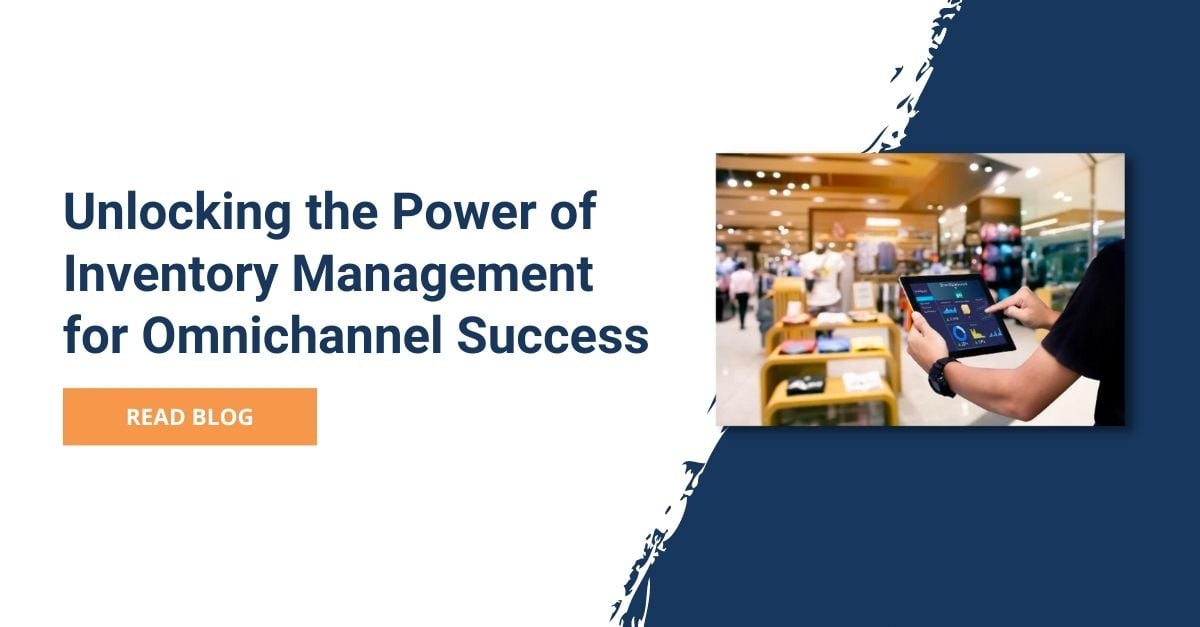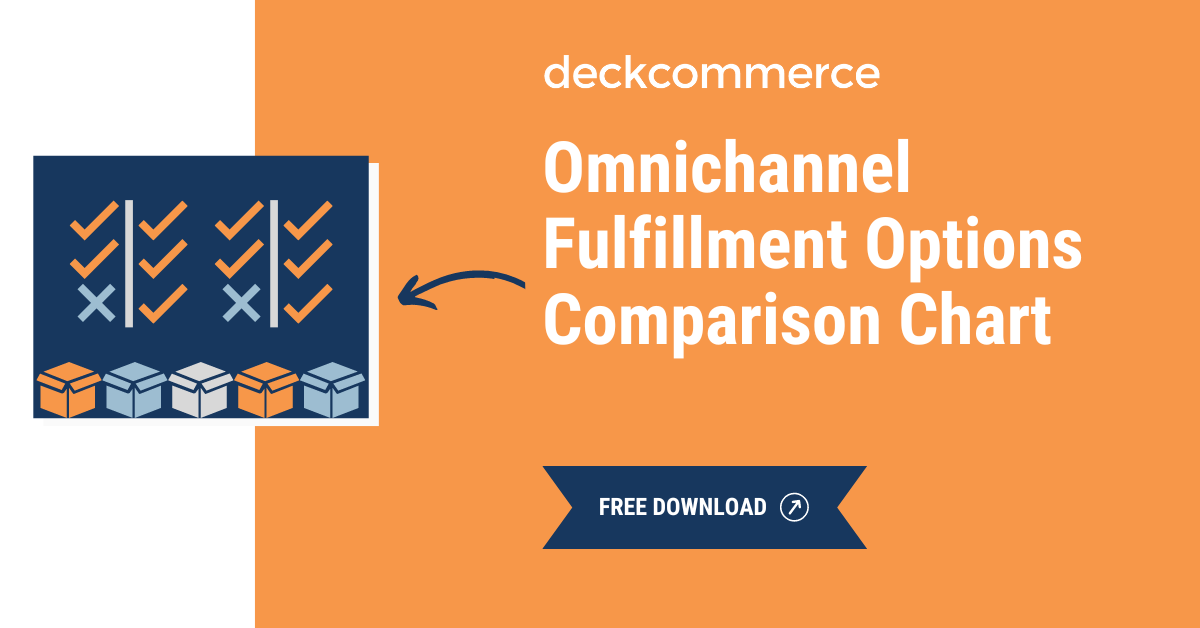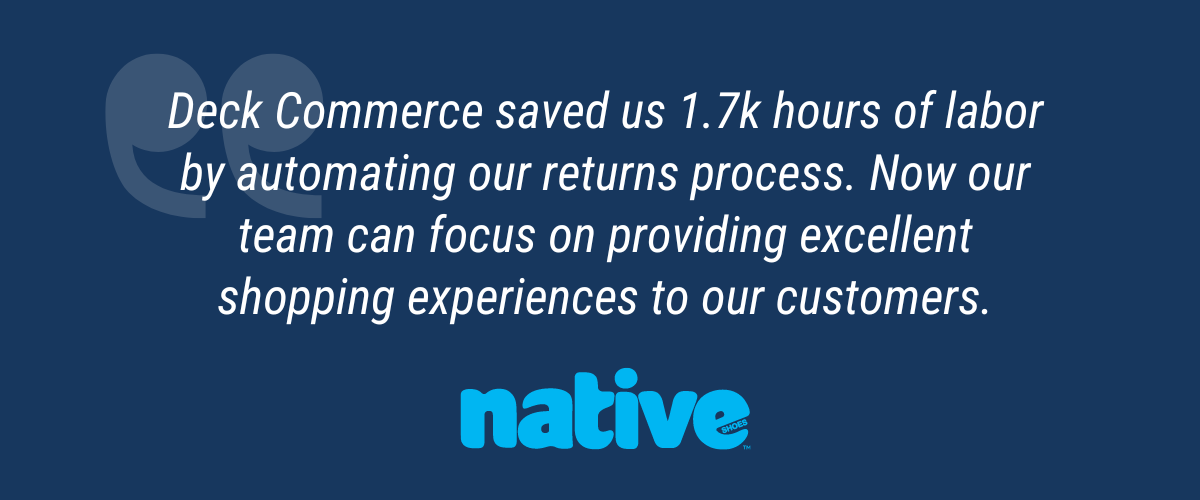
Whether you're a budding online merchant or an established retailer looking to upgrade your order management processes, understanding the operational significance of a high-quality Order Management System (OMS) could be the competitive advantage your operation needs for eCommerce dominance.
This blog takes an in-depth look at the intricacies of order management, exploring the pivotal role of OMS technology in streamlining eCommerce operations, enhancing customer experiences, and driving business growth.
So, let's jump in and explore the impact of an order management system on eCommerce operations.
The Importance of an Order Management System for eCommerce Retail
Order management systems act as a digital wayfinder guiding orders from inception to fulfillment. It's a technological solution designed to bridge the gap between how customers place orders and how they are processed and delivered.
Order Management System Definition
An Order Management System (OMS) is a digital tool or platform used in eCommerce and retail to track sales and manage orders, inventory, and customer service. It acts as a centralized system that integrates all aspects of the retail process, from the point of sale to the delivery of products to customers.
Who Needs an OMS?
An OMS is a key asset for navigating modern commerce's complexities, helping optimize operations, expand market reach, and improve customer satisfaction.
It is especially important for these specific types of retailers.
|
|
Description |
Why They Need an OMS |
|
High-Volume Retailers |
Businesses processing a large number of orders daily |
Need an OMS for efficient, automated order management. |
|
Complex Fulfillment Operations |
Retailers with varied shipping partners, multiple delivery options, & diverse products. |
Benefit from an OMS's streamlined fulfillment processes. |
|
Global Retail Presence |
International retailers managing cross-border commerce complexities like shipping regulations, currency conversions, and localization |
Crucial for addressing international complexities and ensuring smooth operations. |
|
Multiple Fulfillment Nodes |
Businesses using various fulfillment sources, including warehouses, drop-shippers, and stores |
Require an OMS for cohesive inventory and order management across all sources. |
|
Multi-Channel Retailers |
Retailers selling across different platforms, such as online, in-store, and social media |
Need an OMS for consistent, integrated customer experiences across all channels. |
|
Omnichannel Brands |
Retailers aiming to implement or enhance omnichannel capabilities |
Vital for integrating online and offline sales channels and providing a unified brand experience. |
Core Functionalities of the Best eCommerce Order Management Systems
.png?width=500&height=500&name=website%20images%20-%20Free%20Downloads%20(15).png)
Advanced Order Processing
A high-quality OMS doesn't just capture orders; it transforms order processing into a strategic advantage. Centralizing orders from diverse channels enables businesses to manage complex multi-channel strategies efficiently.
This includes handling pre-orders, back-orders, and custom orders, ensuring that each customer's unique needs are met with precision and care.
The system's agility in adapting to various scenarios, like peak season demands or promotional events, ensures that businesses can scale operations without compromising customer experience.
Streamlining Multi-Channel Sales
eCommerce doesn't happen in a vacuum.
Sales channels range from online marketplaces and brand websites to social media platforms and brick-and-mortar stores. An OMS unifies these disparate channels, providing a consistent and updated view of sales across the board.
This centralization is crucial for maintaining a coherent strategy and ensuring customers receive the same quality service, regardless of where they make their purchase.
Dynamic Inventory Management
One of the most significant challenges in eCommerce is maintaining an accurate inventory across all sales channels.
Beyond visibility, a top-tier OMS offers a sophisticated approach to inventory management. It provides real-time insights into stock levels across all storage locations, including warehouses and physical stores.
This comprehensive overview allows for intelligent inventory allocation and replenishment, minimizing the risks of overselling and stockouts. The system's ability to predict inventory needs based on sales trends and seasonality ensures optimal stock levels at all times, contributing to a more efficient supply chain.
Enhanced Customer Service
In today's customer-centric world, an OMS plays a pivotal role in delivering exceptional service. It empowers service representatives with instant access to complete order histories and customer profiles, enabling them to provide personalized support.
This includes handling inquiries, processing exchanges or refunds, and resolving issues swiftly. The system's integration with customer relationship management (CRM) tools further enriches the quality of service, fostering customer loyalty and repeat business.
Seamless Fulfillment Coordination
An OMS streamlines the entire fulfillment process, from the moment an order is placed to its final delivery. It intelligently routes orders to the most suitable fulfillment centers based on factors like proximity to the customer, inventory availability, and shipping costs.
This orchestration ensures faster delivery times, reduced shipping costs, and improved customer satisfaction. The system's ability to handle complex scenarios, such as split shipments and cross-border logistics, makes it an indispensable tool for global eCommerce operations.
Efficient Returns Management
Managing returns is as crucial as managing sales. A high-quality OMS simplifies the return process for both customers and staff. It provides clear, automated workflows for processing returns, exchanges, and refunds, ensuring a hassle-free customer experience.
The system's ability to analyze return patterns also offers valuable insights into product performance and customer preferences, aiding in quality control and inventory planning.
By making the return process smooth and transparent, businesses can maintain customer trust and reduce the costs associated with returns.
3rd-Party System Integrations
A robust OMS doesn't operate in isolation; it integrates seamlessly with other systems to capture and share information across all business areas, from financial reporting to customer relationship management.
How Order Management Software Differs From Other Systems
While there might be some functional overlap with systems like Enterprise Resource Planning (ERP) or Customer Relationship Management (CRM), an OMS has distinct capabilities.
- Unlike an ERP, which is often more finance-focused, an OMS is dedicated to the operational side of order transactions.
- A CRM primarily handles customer data and interactions, while an OMS takes charge of the actual order lifecycle.
- An OMS is agile and adaptable to the dynamic nature of eCommerce, often more so than the broader scope of an ERP or the customer-centric focus of a CRM.
|
|
Order Management Software (OMS) |
Enterprise Resource Planning (ERP) |
Customer Relationship Management (CRM) |
|
Primary Focus |
Operational side of order transactions |
Finance-focused |
Customer data and interactions |
|
Order Lifecycle Management |
Yes |
Partial |
No |
|
Agility and Adaptability |
Agile and adaptable to eCommerce dynamics |
Less agile for eCommerce |
Customer-centric, not order-focused |
To meet the unique and evolving needs of online retail, an OMS is a must. It's not just about managing orders; it's about creating a cohesive ecosystem where sales, inventory, fulfillment, and customer service work together to deliver a superior shopping experience.
Enhancing Order Management Capabilities Through Seamless Integrations
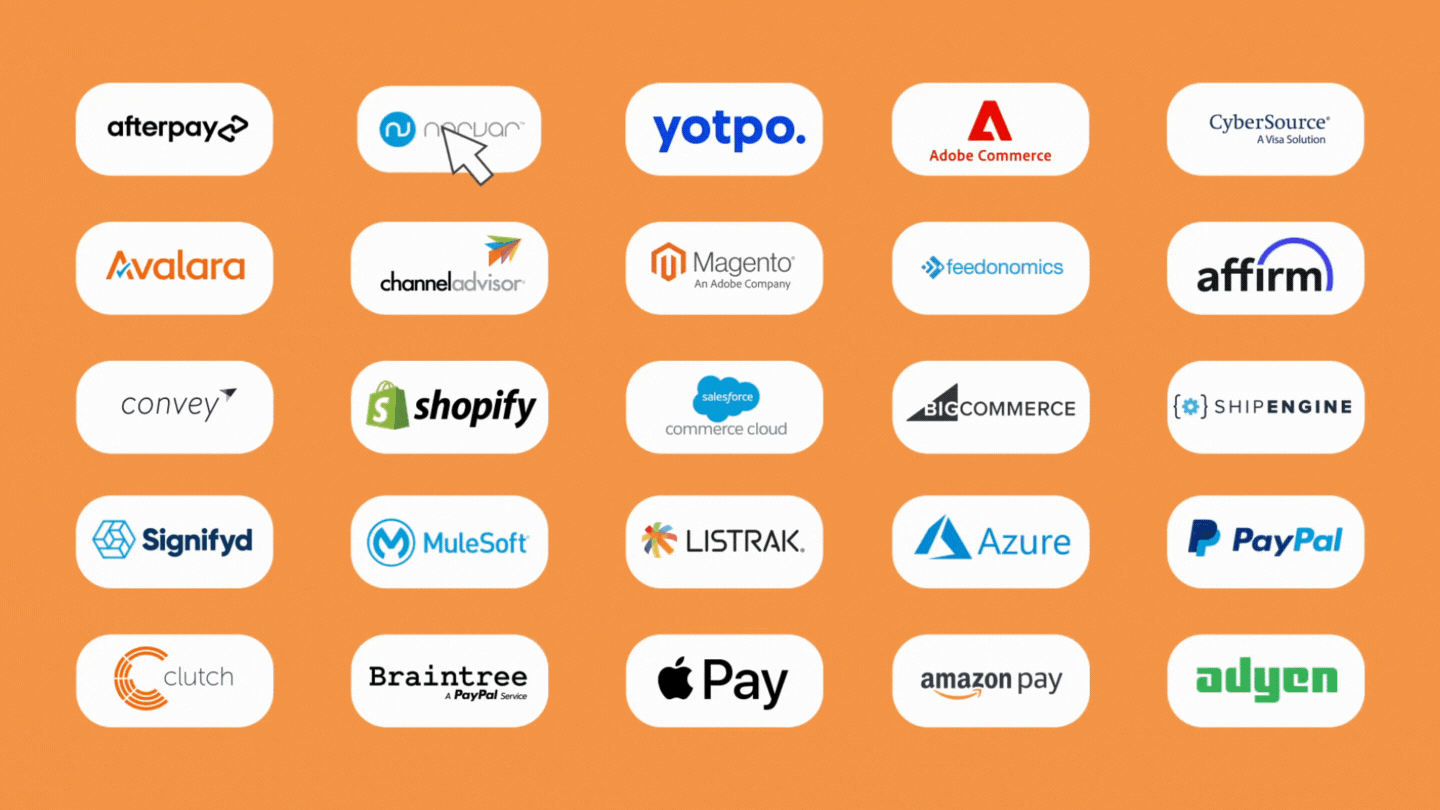
The true power of an OMS lies in its ability to integrate with other business systems, transforming it into a central hub that drives efficiency and scalability.
The right integrations can enable a holistic approach to managing every aspect of eCommerce operations, from inventory and customer relationships to payment processing and shipping.
Here’s a closer look at some of the most common integrations.
- eCommerce Platform: Integration with major eCommerce platforms like Shopify, Magento, and BigCommerce ensures smooth data flow between the online store and the OMS, facilitating real-time inventory updates and order processing.
- ERP Systems: Linking with Enterprise Resource Planning (ERP) systems allows for efficient management of back-end processes like accounting, procurement, and supply chain operations, ensuring consistency across all business functions.
- CRMs: CRM integrations (Salesforce, HubSpot, etc.) help in maintaining detailed customer profiles, tracking customer interactions, and personalizing the shopping experience.
- Payment Gateways & Fraud Detection: Secure payment processing and fraud detection tools can be integrated to safeguard transactions and enhance customer trust.
- Shipping and Fulfillment Services: Connections with various shipping carriers and fulfillment services enable efficient order dispatch, tracking, and delivery, improving the overall customer experience.
- Analytics and Reporting Tools: Integrating analytics tools helps gather insights on sales trends, customer behavior, and inventory management, aiding in strategic decision-making.
- Marketing Platforms: Linking with marketing platforms ensures that promotional strategies are aligned with inventory levels and sales data, enabling more effective marketing campaigns.
- POS Systems: Integration with point-of-sale systems is crucial for retailers with physical stores, ensuring that online and offline sales channels are synchronized.
An order management system is not just about managing orders—it's about leveraging technology to drive business growth.
eCommerce Challenges Solved by an OMS
By automating and streamlining order processing, inventory management, and customer service, an OMS can turn potential obstacles into opportunities for growth and improved customer satisfaction.
Sales Volume Fluctuations
eCommerce businesses often struggle with the unpredictability of sales volumes, especially during peak seasons, sales events, or product launches. An OMS enables businesses to manage high order volumes without compromising speed or accuracy by automating order processing and fulfillment workflows.
Inventory Mismanagement
Inaccurate inventory tracking can lead to overstocking, stockouts, and lost sales. Too much leads to increased holding costs, while too little results in lost sales and dissatisfied customers. An OMS provides real-time inventory visibility and intelligent forecasting, helping businesses maintain optimal inventory levels across all channels and locations.
The ‘Amazon Effect’
The rise of giants like Amazon has significantly raised customer expectations in the eCommerce space.
Consumers now demand rapid, accurate, and transparent order processing and delivery - a standard now known as the 'Amazon Effect.' An OMS is crucial in meeting these heightened expectations. It ensures precise order tracking, provides timely updates and manages returns and exchanges efficiently.
Excelling in these areas is key to enhancing customer satisfaction, fostering loyalty, and encouraging repeat business in an environment where eCommerce leaders continually reshape expectations.
Adapting to Dynamic Fulfillment Needs
An OMS can transform physical stores into active fulfillment centers, enabling methods to fulfill orders more efficiently.
- Ship-from-Store (SFS)
- Buy Online Pickup In-Store (BOPIS)
- Curbside Pickup
- Buy Online Return In-Store (BORIS)
- Picking-Packing-Shipping
Such flexibility optimizes inventory usage and cuts down on delivery times and costs.
An order management system delivers a more agile and cost-efficient fulfillment process by smartly routing orders to the most suitable warehouses, distribution centers, or retail stores.
This is especially crucial for businesses that swiftly adjust to market shifts and consumer trends, a strategy well-demonstrated in Deck Commerce's case studies.
Operational Inefficiency
.png?width=600&height=200&name=Email%20Header%20600x200%20(5).png)
Manual order processing is time-consuming and prone to human error. An OMS automates the order fulfillment process, from routing orders to the best fulfillment location to generating shipping labels. This integration reduces manual intervention, minimizes errors, and speeds up the entire order-to-cash cycle.
Customer Service Delays
Without an integrated system, customer service representatives struggle to access up-to-date order information, leading to delays in resolving customer inquiries. An OMS offers immediate access to order statuses and history, empowering customer service teams to provide quick and effective support.
Scalability Issues
As eCommerce businesses grow, they often outgrow their manual processes and basic systems. An OMS is scalable and capable of handling increased order volumes and complexity without sacrificing performance or customer experience.
Storefront Migrations
Migrating to a new eCommerce platform poses risks of data loss, downtime, and disruption to customer service. An OMS can facilitate these migrations by acting as a stable intermediary layer that maintains order continuity and inventory synchronization throughout the transition.
This capability is crucial for businesses that need to upgrade their eCommerce solutions without sacrificing operational efficiency or customer experience.
Omni-Channel Complexity
Selling across various online platforms, marketplaces, and even physical stores adds complexity to order management. An OMS simplifies this by offering a unified platform consolidating orders from all channels.
This centralization eliminates the risk of errors and inconsistencies, ensuring a cohesive brand experience for customers regardless of where they purchase.
How Order Management Systems Powers Omnichannel Fulfillment
Advanced order routing and distributed order management (DOM) capabilities enable retailers to optimize their fulfillment strategies.
Key fulfillment options include:
- Curbside Pickup & BOPIS (Buy Online Pickup In Store): These options cater to the convenience and immediacy that modern customers demand, bridging the gap between online and physical retail experiences.
- Ship from Store / Store Fulfillment: Leveraging retail stores as mini-distribution centers, this method maximizes the use of inventory and reduces delivery times.
- BORIS (Buy Online Return In Store): This feature simplifies the return process, encouraging customer confidence in purchasing online.
- Cross-Channel Inventory Allocation & Visibility: An OMS provides a unified view of inventory across all channels, ensuring optimal stock levels and minimizing the risk of over-selling or stockouts.
- Split Shipments & Drop Shipping: These functionalities allow for more flexible and efficient order fulfillment, adapting to various customer needs and logistical scenarios.
An OMS like Deck Commerce offers smart routing logic based on fulfillment capacity, inventory, proximity, and more, ensuring orders are fulfilled from the best location at the best cost.
eCommerce Order Management System Case Studies
Streamlined Fulfillment for Global Retailer
Discover how a renowned global footwear brand transformed its order management by automating 98% of its orders with Deck Commerce. This strategic move not only minimized errors but also significantly enhanced customer experiences, even amidst the e-commerce surge of 2020.
Build-a-Bear’s Omnichannel Pivot
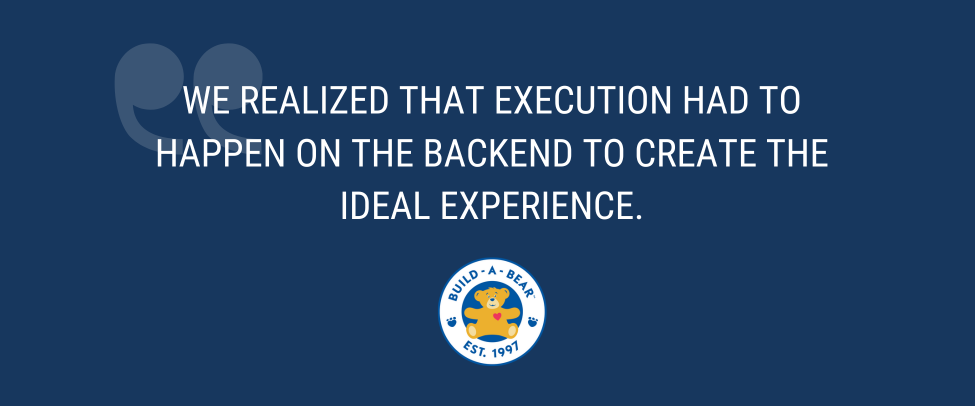
In just four weeks, Build-A-Bear turned over 400 stores into fulfillment centers with the help of Deck Commerce and ShipEngine. This quick adaptation doubled their initial shipping goals and proved crucial in navigating the retail challenges posed by the pandemic. [See how they achieved this remarkable feat.
Have Order Management Questions? Talk to DTC Experts
Adopting new technology and optimizing your eCommerce operations can be a complex journey, and you may have questions or need guidance along the way.
Our DTC and order management solutions experts can assist you with any inquiries you may have regarding OMS implementation, integration, and how it can specifically benefit your unique business. We can discuss your specific requirements, share best practices, and help you navigate the intricate world of order management in eCommerce.

